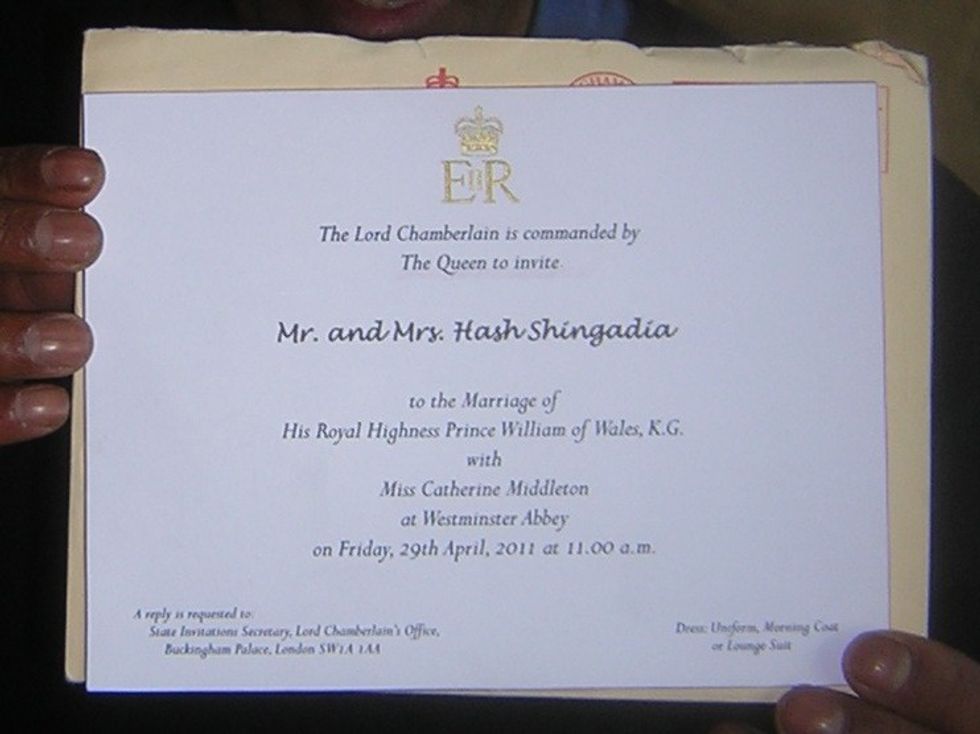JUST before Prince William and Kate Middleton got married in Westminster Abbey, on April 29, 2011, I went to see Hasmukh and Chandrika Shingadia in the Berkshire village of Upper Bucklebury, where they ran the local Peach’s grocery store cum sub-post office.
They had been invited to the royal wedding and proudly showed me their invitation card. They had known “Catherine” since she was a little girl and she and her parents often dropped into the store. Later, Kate would bring in William, who asked after their daughters, Meera and Maya.
They were an ordinary Gujarati family who lived above the shop, with a corner set aside for Hindu deities. Being Asian, they were reluctant to go to the wedding without presents, so I arranged for two Indian fashion designers to make special outfits for Kate. One was a £7,000 silver chain dress. The gifts were picked up from Hasmukh’s shop by Kate’s father, Michael.
Shortly after the wedding. Hasmukh became a victim of the Horizon computer scandal. He couldn’t account for a shortfall of £16,180.60 shown in an audit.
I wish he had confided in me. He was bullied into pleading guilty to fraud, and was sentenced to eight months’ imprisonment suspended for 12 months with a requirement of 200 hours of unpaid work.
He also “repaid” the money he hadn’t taken from the Post Office. After that he was a broken man. It didn’t help he was also being treated for cancer. His conviction was not quashed until 2021.
The Post Office had probably wanted to make an example of a high-profile Asian subpostmaster.
During the Watergate scandal which brought down US president Richard Nixon in the early 1970s, the crime was not so much the burglary, but the White House’s attempt to cover up the wrongdoing. Similarly, the Post Office had sought to cover up its faulty Horizon computer system installed by Fujitsu of Japan.

At the Horizon public inquiry last week, Stephen Bradshaw was told that he and he and his fellow Post Office investigators had been behaving like “mafia gangsters”. But given the way the Post Office has been acting, mafia gangsters would be quite justified in taking legal action for slander.
One of the heroes of the story, the journalist Nick Wallis, called Bradshaw “one of the worst investigators in history”.
Bradshaw said he was “not technically minded”. But in 2010 he made a statement declaring “absolute confidence” in Horizon. He revealed it was written by lawyers, but he had just signed it. Bradshaw should clearly be in prison, along with his former boss, Paula Vennells, the Post Office CEO from 2012 to 2019. She is offering to hand back her CBE in the hope this gesture will be enough to prevent a criminal prosecution.
There is now enough evidence to prove she and an entire gang of people at the Post Office were intent on prosecuting subpostmasters even though they realised the Horizon computer was at fault.
Bradshaw, who was exposed as a liar and a bully in forensic questioning by the inquiry’s counsel, Julian Blake, is an utter disgrace. One subpostmaster in Newcastle, Shazia Saddiq, said Bradshaw called her a “bitch” when she wouldn’t confess to stealing money she hadn’t.
Seema Misra’s name came up when Bradshaw gave evidence last week. In 2010, she was sent to prison for 15 months for stealing £74,000 while she was pregnant.
She was released after four months, but it took 11 years to clear her name. The ITV drama, Mr Bates vs The Post Office, should have made more of her case.
The Post Office scandal cannot end unless justice is seen to be done. And that does mean jailing some of the key villains. People like Bradshaw were on fat bonuses and salary increases if they made a kill.

Along with prison sentences, they need to be subjected to punitive fines.
Prime minister Rishi Sunak has promised to overturn the convictions en masse. But it is my understanding that some subpostmasters may have left the UK and sought to build a new life in India.
In the Horizon debates in the Commons last week, the Post Office minister, Kevin Hollinrake, said: “We have seen whole lives ruined by this brutal and arbitrary exercise of power (by the Post Office). The evidence already emerging from Sir Wyn Williams’s inquiry has shown not only incompetence, but malevolence in many of their actions.”
He said the inquiry was due to be completed by end of the year, “and, hopefully, it will report soon after. At that point in time, we will be able to assess more clearly who is actually responsible.
“As regards individuals, it may be that there is sufficient evidence for the authorities to take forward individual prosecutions, and I think many in the House would welcome that.”
Many MPs spoke of the need to prosecute guilty people in the Post Office. Its prosecutions have been described by appeal court judges as “an affront to justice”.
Bob Blackman, Tory MP for Harrow East, said the minister had “mentioned the malevolence that took place during these prosecutions. How is it right that individuals who gave false evidence are potentially still in post? Why are Post Office managers still in post when they knew what was happening? Should they not be brought to account and lose their livelihoods and pensions, rather than those who were wrongly convicted?”
Hollinrake replied: “The short answer is yes; people who are guilty of offences – ones that can be prosecuted – should be brought to account. All kinds of different routes might be available to make sure they suffer as a result of their actions. We are keen to make sure that happens.”
The minister went on: “Of course, our prosecutors can look at the evidence before the inquiry at any point. Anybody can see what is happening in the inquiry. We hope the inquiry identifies those responsible, and suitable action is taken against those people and organisations.”
Fujitsu is also in the crosshairs. Sir David Davis, the Tory MP for Haltemprice and Howden, asked: “Will Fujitsu will be required to meet some of the costs of the undoubtedly enormously expensive compensation that we are paying out? Finally, will the government accelerate the investigations to convict those who are really guilty of causing the scandal by perverting the course of justice?”
Another Tory MP, Virginia Crosbie, who represents Ynys Môn, asked if the minister would meet one of her constituents, Noel Thomas, whose conviction for false accounting in 2006 was overturned in 2021.
The minister replied: “I would be delighted to meet Noel Thomas.”
Hollinrake was not going to repeat the mistake the Liberal Democrat leader, Sir Ed Davey, had made when he was postal minister between 2010 and 2012 in Da[1]vid Cameron’s coalition government. He refused to meet sub-postmaster Alan Bates, whom the ITV drama is named after, saying in a short letter it “wouldn’t serve any purpose”.
And now a woman who spent more than three decades working for the Post Office is planning to stand against Davey in the general election.
Yvonne Tracey, who lives in Davey’s constituency of Kingston and Surbiton in southwest London, said the ITV drama had made her “very sad” and “very angry”. The 68-year-old grandmother said she cannot allow him to “stand again unchallenged”.
The Labour leader, Sir Keir Starmer, has also been damaged by the scandal. He says he wasn’t aware of the three Horizon cases brought against subpostmasters by the Crown Prosecution Service when he was its director from 2008 to 2013. That might well be true, but the plight of subpostmasters has not been one of his concerns.




